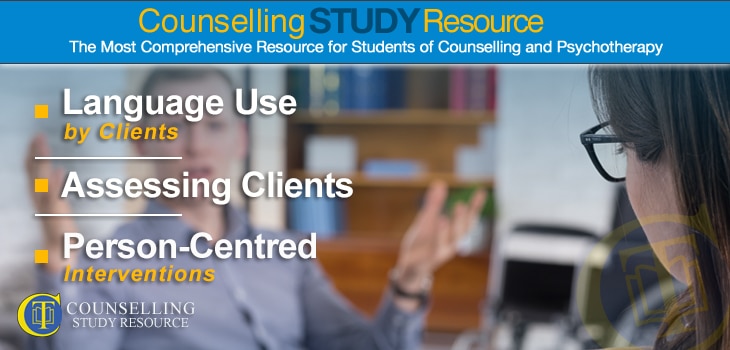064 – Language Use by Clients – Assessing Clients – Person-Centred Interventions
In episode 64 of the Counselling Tutor Podcast, Ken Kelly and Rory Lees-Oakes discuss what to do when a client uses language that you might be uncomfortable with or not understand. Next, in a brand-new slot – ‘Practice Matters’ – Rory offers guidance on assessing clients. Last but not least, the presenters discuss person-centred interventions.
Language Use by Clients (starts at 3.35 mins)
Suppose a client uses the phrase ‘That’s gay’ to describe something in a disparaging way: should you challenge them on this usage?
Rory believes that our job as counsellors is not to be agents of social change, policing clients’ use of language. It is possible that the client may be testing the counsellor, or even that the usage may link to what is going on for the client. Another possibility is simply that the language is part of the client’s vernacular, and that they don’t realise that it may cause offence. What matters is the intent behind the words.
If we are unsure what a client means by a certain word or phrase, it is best to clarify this with them. In this example, we could say, ‘When you say, “That’s gay,” I wonder what you mean by that.’ Exploring their language use in this way can help us find out where they are in their development and in acceptance of self.
Another example if a possible ambiguity might be a client describing something as ‘sick’ (which, in the UK, traditionally means unwell, but can also be used – especially by young people – in a positive sense, to mean that something is really good.
Assessing Clients (starts at 11.41 mins)
Although client assessment may seem not to be a natural part of person-centred counselling, in fact it has always been part of this modality, even in Carl Rogers’ day. For example, Gloria – with whom Rogers carried out a famous filmed session – was handpicked for this.
Why is it important to assess clients? Rory talks through a number of different areas that it is important to cover in assessment in order to prepare properly for the start of therapy. These include the client’s needs for and expectations of therapy, support requirements (e.g. for interpreters, disabled access, hearing loops and preference regarding therapist gender) and working style.
Sometimes, what you can offer may not be right for the client (in which case, a referral may be needed) – or not right for the client at this time (e.g. if they have other practical issues, such as financial problems, that they need help with from another agency first).
Should you read a client’s referral information before you see them for the first session? Rory used to choose not to do this, believing that this would help him hear the client without a filter – but now he thinks it is better to do so. One particular advantage of reading the referral in advance is that it avoids a client who has been affected by abuse, neglect or trauma from going over it all again if they would prefer not to.
Finally, Rory asks: should students do assessments? In agencies where students are working, there will usually be a qualified, experienced counsellor who assesses new clients and then allocates them to an appropriate therapist. But it is still a good idea to do your own ‘soft’ assessment at your first session with a new client, partly as it may have been some time since their initial assessment, and partly as it sets a good habit for when you are qualified and perhaps working in private practice.
You can download Rory’s handout on this topic here, or it is also available in the Handouts Vault and Counselling Study Resource (CSR).
Free Handout Download
Why Do a Counselling Assessment
Person-Centred Interventions (starts at 27.33 mins)
Does person-centred counselling use interventions? Rory explains that this modality has changed over the years, so that Rogers’ session with Gloria is not representative of typical person-centred work these days.
‘Interventions’ could be seen as synonymous with ‘skills’; Ken and Rory talk through the various interventions that you might use, including the core conditions (three of the six necessary and sufficient conditions), immediacy, questions (which must be used appropriately, e.g. to clarify our understanding of the client’s frame of reference) and silence. All these can be very powerful in the therapy room.
Links and Resources
Counselling Tutor Facebook group
